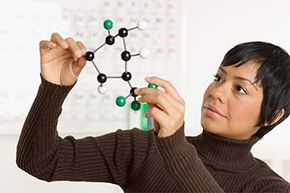Even if you have never landed a spot on "American Idol", you're a star. In fact, we all are. Nearly every atom within us was crafted billions of years ago by a star, but how many atoms are in the human body? Billions upon billions.
As stars burned, exploded, and eventually died, they created these basic elements that now appear in everything from stones and buildings to butterflies and humans. The exceptions to our star-based elemental origins are hydrogen atoms and other lightweight elements thought to have formed even earlier, at the very beginning of the universe [source: Tyson].
Advertisement
Here's a sense of scale to consider: Each of us is composed of more atoms than the Milky Way is composed of stars. And if you'd like to get more specific, this article will even share how you can roughly determine the number of atoms inside your own body.
